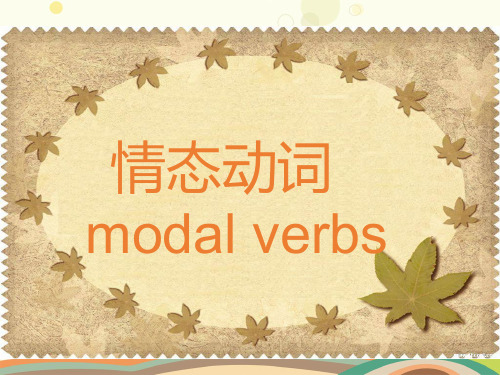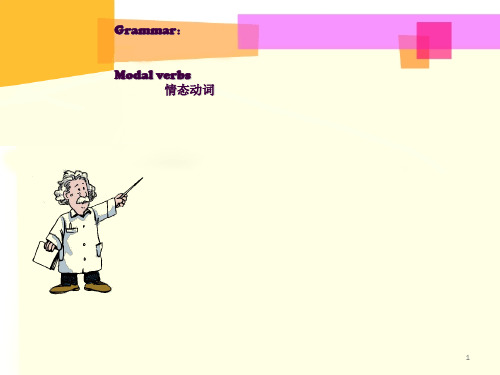优秀课件初中英语情态动词课件(共27张PPT)
合集下载
情态动词(20张PPT)初中英语专项复习课件

看法。
(1)只作情态动词:must;can/could;may/might;ought to
(2)既可作情态动词又可作实义动词:need,dare
((34))既 具可 有作 情情 态态 动动词词某又些可特作征稿稿定助:定hPa动PPvTP,e词T/海h:量asd素ha材tlo持l;/s续hha更odublde;twteirll/would
【知识拓展】
1. must的一般疑问句,肯定回答为Yes, ...must.;否定回答为No, ...needn’t./No, ...don’t have
to.—Must I clean the classroom now? 我必须现在打扫教室吗?
—Yes, you must. 是的,你必须。/No, you don’t have to. /No, you needn’t. 不,你不必。
He promised he would never smoke again. 他承诺他再也不吸烟了。
Their English teacher would tell them stories in
表示过去反复发生的动 English after class.
作或某种倾向
他们的英语老师总是在课后用英语给他们讲故事
新,上千款模板选择总有一
款适合你
知识点二:情态动词的特点
情态动词的特点: (1)情态动词无人称和数的变化(have to除外); (2)情态动词后接动词原形; (3)情态动词的否定式是在其后加not; have to除外 (4)具有助动词的作用,可用来构成否定句、疑问句及用于简明答语; (5)个别情态动词有现在式和稿过定去PP式T两种形式,过去式用来表达更加客气、委 婉的语气,时态性不强,可稿用定于PPT过,海去量、素材现持在续更或将来。
(1)只作情态动词:must;can/could;may/might;ought to
(2)既可作情态动词又可作实义动词:need,dare
((34))既 具可 有作 情情 态态 动动词词某又些可特作征稿稿定助:定hPa动PPvTP,e词T/海h:量asd素ha材tlo持l;/s续hha更odublde;twteirll/would
【知识拓展】
1. must的一般疑问句,肯定回答为Yes, ...must.;否定回答为No, ...needn’t./No, ...don’t have
to.—Must I clean the classroom now? 我必须现在打扫教室吗?
—Yes, you must. 是的,你必须。/No, you don’t have to. /No, you needn’t. 不,你不必。
He promised he would never smoke again. 他承诺他再也不吸烟了。
Their English teacher would tell them stories in
表示过去反复发生的动 English after class.
作或某种倾向
他们的英语老师总是在课后用英语给他们讲故事
新,上千款模板选择总有一
款适合你
知识点二:情态动词的特点
情态动词的特点: (1)情态动词无人称和数的变化(have to除外); (2)情态动词后接动词原形; (3)情态动词的否定式是在其后加not; have to除外 (4)具有助动词的作用,可用来构成否定句、疑问句及用于简明答语; (5)个别情态动词有现在式和稿过定去PP式T两种形式,过去式用来表达更加客气、委 婉的语气,时态性不强,可稿用定于PPT过,海去量、素材现持在续更或将来。
中考英语复习情态动词课件(共27张PPT).

ought to侧重于表示按照法律,法规等规 定,就强制意义的责任或义务。
should含有个人意见,强调主观看法,语 气比ought to稍弱。
had better
1. It’s raining outside, you’d better stay at home. 2. It’s very cold, you had better not go out.
may表示请求时,肯定回答用may, can;否定回答用mustn’t 或can’t。
二、表示义务类
1. Students must finish their homework before class. 2. I have to go now. 3. Children should learn to respect others. 4. I need type this letter before work. 5. I need to type this letter before work.
must:必须 have to: 不得不 should:应该 need:需要
need 需要(情态动词、实意动词) have to 不得不
三、表示能力类
1. I can draw. = I am able to draw. 2. I could ride a bike when I was six years old.
能,可能,应该, 必须,不得不,需要
最好,将要,可以
must表示肯定是,用于肯定句 can 表示可能,用于否定句,疑问句 may表示可能,用于肯定句
“肯定 是”
“不可 能是”
“可能 是”
对一般现 对现在进 对一般过 对过去进 在推测 行推测 去推测 行推测
情态动词讲解精ppt课件

例句
will/would
详细描述:will 表示现在的意愿或 预测,would 表示过去的或虚拟 的意愿或预测。
1. I will help you with your project.(我会帮助你完成你的项 目。)
总结词:表示意愿或预测
例句
2. They would have gone to the party if they had known about it earlier.(如果他们早点 知道,他们就会去参加聚会。)
表示意愿
情态动词+动词原形,如 would like to go,表示 某人想要去。
形式变化
基本形式
情态动词的基本形式包括 现在时、过去时和将来时 。
过去式
情态动词的过去式通常是 在基本形式后面加-d或ed,如could have done 、should have done等。
将来时
情态动词的将来时通常是 在基本形式后面加-will或shall,如will be able to 、shall have to等。
may与might的区别与联系
总结词
may表示现在的许可或可能性;might表示过去的可能性或许可。
详细描述
may用于肯定句中,表示许可或可能性,例如“You may use this room.”(你可以使用这个房间。 )“The book may be in the library.”(这本书可能在图书馆里。)might表示过去的可能性,常 用于过去时态的句子中,例如“He might come tomorrow.”(他明天可能来。)
未必、很难说
She might not agree with us.
表示虚拟语气
will/would
详细描述:will 表示现在的意愿或 预测,would 表示过去的或虚拟 的意愿或预测。
1. I will help you with your project.(我会帮助你完成你的项 目。)
总结词:表示意愿或预测
例句
2. They would have gone to the party if they had known about it earlier.(如果他们早点 知道,他们就会去参加聚会。)
表示意愿
情态动词+动词原形,如 would like to go,表示 某人想要去。
形式变化
基本形式
情态动词的基本形式包括 现在时、过去时和将来时 。
过去式
情态动词的过去式通常是 在基本形式后面加-d或ed,如could have done 、should have done等。
将来时
情态动词的将来时通常是 在基本形式后面加-will或shall,如will be able to 、shall have to等。
may与might的区别与联系
总结词
may表示现在的许可或可能性;might表示过去的可能性或许可。
详细描述
may用于肯定句中,表示许可或可能性,例如“You may use this room.”(你可以使用这个房间。 )“The book may be in the library.”(这本书可能在图书馆里。)might表示过去的可能性,常 用于过去时态的句子中,例如“He might come tomorrow.”(他明天可能来。)
未必、很难说
She might not agree with us.
表示虚拟语气
情态动词-完整版PPT课件

情态动词 modal verbs
1.情态动词的用法特点
1)情态动词 除 ought 和 have 外,后面只能 接不带to 的不定式。 2)情态动词没有人称,数的变化,即情态动 词第三人称单数不加-s。 3)情态动词没有非谓语形式,即没有不定式, 分词等形式。
can could may might shall should must will would ought to
have to dare need used to
表示推测
情态动词
不表示推测
2.表示推测——情态动词的重要用法.
情态动词
对将来
对现在
对过去
m肯ust/定sho的uld 推测
+ V. + V. + have done
常见must be + be doi定的推测 can’t, couldn’t
疑问的推测
can, could
+ V.
+ V.
+ have done
+ be doing
可以用not表示“可能不”
+V.
+ V.
+ have done
+ be doing
+ V.
+ V.
+ have done
+ be doing
不同的“肯定”程度可按下列层次排列: He is at home. (事实) He must be at home.(非常肯定的推断) He ought to be at home.(很可能) He could be at home.(很可能) He may be at home.(仅仅可能而已) He might be at home.(或许, 非常不确定) He might not be at home.(也许不在家) He may not be at home. (比might可能) He couldn’t be at home.(很可能不在家) He can’t be at home.(一定不在家)
1.情态动词的用法特点
1)情态动词 除 ought 和 have 外,后面只能 接不带to 的不定式。 2)情态动词没有人称,数的变化,即情态动 词第三人称单数不加-s。 3)情态动词没有非谓语形式,即没有不定式, 分词等形式。
can could may might shall should must will would ought to
have to dare need used to
表示推测
情态动词
不表示推测
2.表示推测——情态动词的重要用法.
情态动词
对将来
对现在
对过去
m肯ust/定sho的uld 推测
+ V. + V. + have done
常见must be + be doi定的推测 can’t, couldn’t
疑问的推测
can, could
+ V.
+ V.
+ have done
+ be doing
可以用not表示“可能不”
+V.
+ V.
+ have done
+ be doing
+ V.
+ V.
+ have done
+ be doing
不同的“肯定”程度可按下列层次排列: He is at home. (事实) He must be at home.(非常肯定的推断) He ought to be at home.(很可能) He could be at home.(很可能) He may be at home.(仅仅可能而已) He might be at home.(或许, 非常不确定) He might not be at home.(也许不在家) He may not be at home. (比might可能) He couldn’t be at home.(很可能不在家) He can’t be at home.(一定不在家)
情态动词全部ppt课件

A.must
B.would
C.should
D.might
19
• 翻译 • ----我能在这个房间抽烟吗? .
---- 可以。 ---- 不行,… ----Might/ May I smoke in this room?
---- Yes, you can.
---- No, you mustn’t
20
rule.
(威胁)
26
Shall 决心、承诺、警告、命令 you \he\she\they shall…..(二三人称陈述)
When the chairman turns up, nobody shall say a word. 命令 Students shall remain in their seats until the papers have been
28
5. should
1. should表示义务、职责、劝告,意 为 “应该”。
eg: You should keep your promise. Students should respect teachers.
29
2)表示说话人_惊_讶______等特殊情感。
It’s surprising that Mary should not know Lei Feng.
3.must, need没有时态,但有些情态动词如can、 may,will,have to有一般式和过去式的变化。
4. 情态动词不能单独做谓语,必须和实义动词原形 一起构成谓语。
3
情态动词的“时态”形式并不是时间区 别的 主要标志, 不少情况下, 情态动词的 现在式 形式和过去式形式都可用来表 示现在时 间、过去时间和将来时间。
情态动词精品课件PPT课件

第22页/共52页
• It is usually warm in my hometown in March,but it can be rather cold sometimes.
• 我的家乡在三月份通常很暖和,但有时候也会相当冷。 • Mr.Bush is on time for ever ything.How can it be that he was late for the
meeting? • 布什先生做什么事情都很准时,他怎么可能开会迟到呢? • He can't be in the classroom ,for the light has been turned off. • 他一定不在教室里,因为灯已关了。
第23页/共52页
• 2.may用于肯定句中可以用来表示推测,意为“可能”;用于否定句中也可以表示 推测,may not意为“可能不”,表示一种不太确定的语气。may在疑问句中一般不 表示推测。
You'd better not. 等)不,你不可以用。
第11页/共52页
• 3.must和have to的用法 • must表示“必须、应该”。否定形式must not(mustn't)表示“不应该、不许可、
不准、禁止”等。在回答must的问句时,否定式常用need not(needn't)或don't have to表示“不必”,而不用must not,因为must not表示“禁止”。must表 示“一定、必定”等推测意义时,一般只用在肯定句中。 • The work must be finished as soon as possible. • 这项工作必须尽快完工。
第21页/共52页
• 热点考向二 情态动词表“推测”的用法 • 表示对目前或将来情况的推测往往用“情态动词+动词原形”这种结构。 • 1.can用于肯定句中表示可能性,意为“有时会”;用于疑问句中可以表示推测,意
• It is usually warm in my hometown in March,but it can be rather cold sometimes.
• 我的家乡在三月份通常很暖和,但有时候也会相当冷。 • Mr.Bush is on time for ever ything.How can it be that he was late for the
meeting? • 布什先生做什么事情都很准时,他怎么可能开会迟到呢? • He can't be in the classroom ,for the light has been turned off. • 他一定不在教室里,因为灯已关了。
第23页/共52页
• 2.may用于肯定句中可以用来表示推测,意为“可能”;用于否定句中也可以表示 推测,may not意为“可能不”,表示一种不太确定的语气。may在疑问句中一般不 表示推测。
You'd better not. 等)不,你不可以用。
第11页/共52页
• 3.must和have to的用法 • must表示“必须、应该”。否定形式must not(mustn't)表示“不应该、不许可、
不准、禁止”等。在回答must的问句时,否定式常用need not(needn't)或don't have to表示“不必”,而不用must not,因为must not表示“禁止”。must表 示“一定、必定”等推测意义时,一般只用在肯定句中。 • The work must be finished as soon as possible. • 这项工作必须尽快完工。
第21页/共52页
• 热点考向二 情态动词表“推测”的用法 • 表示对目前或将来情况的推测往往用“情态动词+动词原形”这种结构。 • 1.can用于肯定句中表示可能性,意为“有时会”;用于疑问句中可以表示推测,意
初中情态动词讲解ppt课件

气。 • I want to ask you a question. • =I'd(I would)like to ask you a question. • 我想问你一个问题。 • 3.Would you like~? • 表示请求、劝说,是很客气的说法。 • Would you like a cup of tea? • 您愿意喝杯茶吗?
• b.可能、或许 • (谈论可能性、表示推测,一般用于肯定句)
• Tomorrow I may go shopping. • 明天,我可能(或许)去商店买东西。 • He might be our new teacher. • 他或许是我们的新老师。 • 注意 • might在表示推测时,不表示时态,只是说明可能性比may还要小。
4
must
• a.必须、应该(表示有做某一动作的必要或义务)
• You must buy a ticket. • 你必须买一张票。 • b.一定、准是(表示有把握的判断或推测,一般只用于肯定句中)
• 在You must~.这一句型中,它的意思与祈使句相同。 • You must get up early. =Get up early. • 你必须早起。 • You must study hard. =Study hard. • 你必须用功读书。 • He must be our new teacher. • 他肯定是我们的新老师。 • (语气比may,might要肯定得多)
9
should
• should的用法 • You should read this book. • 你应该读这本书。
• 1.should(应当、应该)用于所有人称,与 ought to~同义。
• You should wait a little more. • =You ought to wait a little more. • 你应该再多等一会儿。
• b.可能、或许 • (谈论可能性、表示推测,一般用于肯定句)
• Tomorrow I may go shopping. • 明天,我可能(或许)去商店买东西。 • He might be our new teacher. • 他或许是我们的新老师。 • 注意 • might在表示推测时,不表示时态,只是说明可能性比may还要小。
4
must
• a.必须、应该(表示有做某一动作的必要或义务)
• You must buy a ticket. • 你必须买一张票。 • b.一定、准是(表示有把握的判断或推测,一般只用于肯定句中)
• 在You must~.这一句型中,它的意思与祈使句相同。 • You must get up early. =Get up early. • 你必须早起。 • You must study hard. =Study hard. • 你必须用功读书。 • He must be our new teacher. • 他肯定是我们的新老师。 • (语气比may,might要肯定得多)
9
should
• should的用法 • You should read this book. • 你应该读这本书。
• 1.should(应当、应该)用于所有人称,与 ought to~同义。
• You should wait a little more. • =You ought to wait a little more. • 你应该再多等一会儿。
初中英语语法-情态动词PPT课件

2021
10
四、 shall
1) shall 用于第一人称,征求对方的意见。 What shall we do this evening? shall I clean the room for you?
2021
11
2) shall 用于第二、三人称,表示说话人给对方的命令、警 告、允诺或威胁。
We should obey traffic laws. You shouldn‘t watch TV every day。 You shouldn’t have made this kind of silly mistakes. Tom should have brought his report today. 这时它可以和 ought to, be supposed to 互换使用
You can never imagine such a gentleman should be so rude to a lady.
2021
15
六: will 和would
1)表示意志或意愿:决心,愿意,…… We will do our best to save the child. 我们会尽力
I’ll not be able to come this afternoon. 当表示“经过努力才得以做成功某事”时应用be able to,
不能用Can。如:
He was able to go to the party yesterday evening in spite of the heavy rain.
Did anyone dare (to) admit it?有人敢于承认吗?
He did not dare (to) leave his car there. 他不 敢把车停放在那里。
情态动词(共43张PPT)

A.Must; mustn't
B.Will; couldn't
C.May; can't
( C ) It's really hot in the room.You'd better
the
windows. A.not to close B.don't close C.not close
(B )
—You
drive after drinking, Simon.
—You're right.I'll take a taxi.
A.wouldn't B.shouldn't C.ought to
二、用恰当的情态动词填空。
Simon, you mmuussttnn''tt play with the knife.You mmayay
在回答以 may 提问的问句时,肯定回答一般可仍用 may 或 Yes, please./Certainly./Sure./Of course.否定回答根据说话人的语气 由强到弱分别选用: mustn't/can't/may not。 —May I watch TV? 我能看电视吗? —No, you mustn't.You must play the piano first.不,你禁止看, 你必须先弹钢琴。
need 的基本用法 意为“需要;必要”,作情态动词时常用于否定句和疑问句中。 You needn't hand in your homework tomorrow.你明天不需要 交你的作业。 Need I attend the meeting this afternoon? 我需要今天下午参 加会议吗?
初中英语-情态动词-课件(共31张PPT)

二、情态动词的用法 4.dare和need
need “需要” dare“敢” 可作情态动词也可作实义动词
• (2)当实义动词使用时,有人称和时态的变化 • e.g.You don't need to do it yourself. • He did not dare(to) look up.
• ——Can you drive a car at present? • ——I_____ do so in the busy street.
• A.may not C.daren't
B.don't dare D.needn't
二、情态动词的用法 ed to和had better
• (1)used to表示过去的习惯动作或状态,现 已不存在。
• e.g.There used to be our playground.
二、情态动词的用法 ed to和had better
time. • I'll not be able to come this afternoon.
二、情态动词的用法
• (2)表客观可能性,在疑问句中表示请求或许可 • e.g.Man can not live without air. • Can I use your pen?
• *could是can的过去时,主要用于疑问句,表示语气委婉。 • 肯定回答用 • 否定回答可用
C.should tell
D.should have told
二、情态动词的用法 7.will和would
(1)表意愿,用于各种人称的陈述句。
• e.g.I will do anything for you. • If you will read the book,I'll lend it to you.
初中英语语法大全——情态动词(共25张PPT)

三. must的用法
1.表示必须 must表示必须多指现在或将来的情况,强调说话者的主观语气即说话者认 为有必要或有义务做某事。对其一般疑问句的肯同答用must,否定回答用 needn't或者don't have to。 Everyone must take notes carefully in Professor Liu’s class. Must I finish the work tonight ? ---Yes, you must. --- No, you needn’t /don't have to.
九、had better的用法
1. 表示劝告或建议 eg: You' d better eat these bananas before they go ba d. 2. had better的否定形式 其否定形式是将not直接放在had better的后面。 eg: You had better not miss the last bus.
3.表示请求或允许 (1)用could 比用can更加迟疑不决,当没有把握得到允许或需 要委婉表达时用could。 eg: Could I take this seat, sir, if you don't mind? eg: You can phone me after six this afternoon. 当允许别人做某事时,答语用cause your cell phone for a while? --- Yes, of course you can.
五. will/would的用法
1、表示意愿 表示自愿做或主动提出做建电如意志 愿望或决心等,可用于各种 人称。would是will的过去式。 eg: I won’t argue with you.我不愿意和你争辩。 eg: Jane said she would not go with Tom, for she didn’t like him. 简说她不愿和汤姆一起去,因为她不喜欢他。
初中情态动词ppt课件

• 4.We_d_o_n_'t_h_a_v_e__to_arrive so early.
命令禁止
must 必须,一定,表达说话人的主观看法 have to 不得不,强调客观需要 mustn't 禁止,不准,绝对不可以 don't have to 没必要
• 4.----Mum,can I wear my jeans to school? • ----No,you________wear your shool uniform.That's the
命令禁止 must have to mustn't don't have to
• 1.He is my best friend,so I__m_u_s_t______help him. • 2.He_h_a_s_t_o______get to school before 8 o'clock. • 3.We_m_u_s_t_n_'t_____sleep in class.
----Yes,please.//----Thanks, but i can manage it. 4.Could you please help me?
----Yes,with pleasure. ----Sorry,I can't.You had better try to ask someone else.
school rule. • A.can B.can't C.have to D.may
• 4.----Mum,can I wear my jeans to school? • ----No,you________wear your shool uniform.That's the
命令禁止
must 必须,一定,表达说话人的主观看法 have to 不得不,强调客观需要 mustn't 禁止,不准,绝对不可以 don't have to 没必要
• 4.----Mum,can I wear my jeans to school? • ----No,you________wear your shool uniform.That's the
命令禁止 must have to mustn't don't have to
• 1.He is my best friend,so I__m_u_s_t______help him. • 2.He_h_a_s_t_o______get to school before 8 o'clock. • 3.We_m_u_s_t_n_'t_____sleep in class.
----Yes,please.//----Thanks, but i can manage it. 4.Could you please help me?
----Yes,with pleasure. ----Sorry,I can't.You had better try to ask someone else.
school rule. • A.can B.can't C.have to D.may
• 4.----Mum,can I wear my jeans to school? • ----No,you________wear your shool uniform.That's the
初一情态动词语法讲解ppt课件

A. can
B. must
C. should
D. May
10.—May I smoke here?
--No, you __________ only do that in the smoking room.
A. can
B. can’t
C. must
D. mustn’t
13
否定回答:
就划线部分提问:Yes, he can.
No, he can’t.
What can your elder brother do?
8
Practice
2.You ______________m__a_y_ (可以) leave now. 否定句:
You may not leave now. 一般疑问句:
应该 意愿 敢 需要 不得不
+ 动词原形
3
肯定
can could may might must should
否定
can not could not may not might not must not should not
缩写否定
can’t couldn’t
/ mightn’t mustn’t shouldn’t
6.—Must I answer this question in English? --No, you _________.
A. mustn’t B. can’t
C. needn’t
D. shouldn’t
7.—Alice, please be quiet! The others __________ hear clearly.
Grammar: Modal verbs
情态动词
- 1、下载文档前请自行甄别文档内容的完整性,平台不提供额外的编辑、内容补充、找答案等附加服务。
- 2、"仅部分预览"的文档,不可在线预览部分如存在完整性等问题,可反馈申请退款(可完整预览的文档不适用该条件!)。
- 3、如文档侵犯您的权益,请联系客服反馈,我们会尽快为您处理(人工客服工作时间:9:00-18:30)。
7. ---David, is that man your head teacher? ---It ______ be him. He’s the tallest in our school. But that man is short.
A. mustn’t B. can’t C. needn’t D. won’t
2 ---Are you going to Beijing by plane?
--- I am not sure. I ______ take a train.
Need
1.需要做.. need to do 2. needn’t 不必 You needn’t worry abou
情态动词复习
can, could
1) 表示能力(体力、知识、技能)。 Can you skate? 技能 Can you lift this heavy box? 体力 Mary can speak three languages. 知识 She could read poems when she was three.
2.---Could I go to the movie this weekend, Dad? ---Yes, you ______. But you have to come back before nine.
A. shall B. must C. need D. can
3. ---Is John coming by train? ---He should, but he ______ not. He likes driving his car.
8. John, you needn’t do your work today, you _____ do it tomorrow if you’re tired.
A. must B. may C. can’t
9. ---Are you going to Beijing by plane? --- So I am not sure. I ______ take a train.
可以
may, might
表示请求和允许 此时可与can互换 --May I smoke in this room? --Yes, you may. -- No, you can’t. 或 No,you mustn’t.
可以
must
1) 表示必须、必要。是说话人的主观看法 You must come in time. -- Must we hand in our exercise books today? -- Yes, you must. 必须 -- No, you needn’t. --No,you don’t have to .
过去的能力
能
2) 表示请求和允许
此时可与may互换
--Can/May I go now? --Yes, you can. --No, you can’t. --不, 不行 或 -- No, you mustn’t. -- 不, 不准 -- Could I come to see you tomorrow? (婉转语气, 不表过去时)
must 与 have to区别
must译为“必须” 而have to多表示客观存在的环境所限,即客观要求 (无奈)而为之,多译为“不得不干某事” I must clean the room because there are too dirty. (无人强迫) I have to leave school because my family is (无耐) poor now. If I buy that car, I’ll have to borrow some money.
表示推测、可能性
might---may---must 也许、 可能、 一定 1.He might be very busy now. 2.He may be very busy now. 3. He must be very busy now.
表示推测的否定形式只有can’t.
不可能或肯定不
1. You’re Tom’s good friend, so you _____ know what he likes best.
A. don’t B. didn’t C. needn’t D. can’t
6. ---Is your brother playing computer games, Ted? ---He ______ do that because the computer doesn’t work.
A. may not B. can’t C. mustn’t D. needn’t
A. must B. can C. may D. need
4.---Could I use your pen? ---Of course you _____.
A. must B. may C. can D. need
5. ---Will you stay here for dinner? ---Sorry, I ______. I have something important to do.
1) shall 用于第一人称,征求对方的意见。 shall I clean the room for you? 2)should 表示应该做… You shouldn‘t watch TV every day。
1. ---______ you play golf? ---No. But I can play table tennis. A. Can B. May C. Must D. Should
A. should B. may C. must D. will
10. ---_____ I swim in that river? ---No, you _______. It’s dangerous to swim in it.
